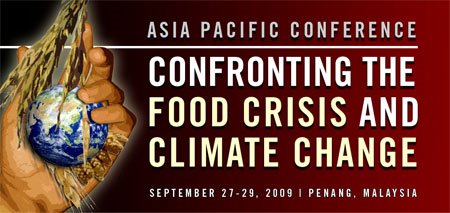Facilitator: Kamla Bhasin
Keynote Address: Sarath Fernando of Movement for National Land and Agricultural Reform (MONLAR), Sri Lanka
Sarath Fernando said that this is an important conference and a crucial moment in our history. He talked about the experiences of peasants, agricultural workers and livestock keepers. He went on to say that we are now experiencing "climate destruction" and not just "climate change" and referred to the recent disaster that hit the Philippines.
Fernando, however said that instead of going through all the tragic and unfortunate things are are happening to the world and, the excluded and discarded people of his society, we should focus on the positive aspects of all these. He enjoined everyone in creating a positive agenda for the rest of the world and that it is time that we should seriously question some of the concepts that we have been adopting, terms of development, growth, exploitation, and the end of nature. He also warned that actually, we are no longer developing but instead, we are moving towards a dangerous side of destruction and survival.
Fernando then shared what is being done by the small farmers, which should enlighten the whole world. MONLAR emerged out of about 15 years of work with farmers. He said that the work that needed to be advanced is the Peasant Information Network. He also spoke about the civil wars in Sri Lanka and how this gave rise to MONLAR. He said that even if there are a lot of things to complain about, things are beginning to change and there are things that bring a lot of hope to the people.
He also said that PAN AP has given birth to a process that should lead the way for the rest of the world. Fernando said, "We need a world without poisons, where we are not compelled to eat and drink poisons. We need food production that does not poison our water, food and environment. Now, the task is to protect, conserve and sustain a system that is basically unsustainable. We need to create a new system of recovery."
In Sri Lanka, inspite of 50-60 years of unsustainable agriculture, he said that there are food that can be gathered from their neighbours and that this gave way to another process in which people planted food in plots of land so that food could be made available. Even without money for fertilizer, pesticides, herbicides, people and communities found ways of doing agriculture without chemical inputs.
Fernando said that the type of agriculture that is free of external inputs is fast becoming a movement, a definite trend, and is growing in Asia. This is what we now refer to as ecological agriculture. He explained that we need a process to restore nature’s ability to regenerate itself. He said that birth, growth, decay and then, regrowth has to be a guiding principle of our survival and that it is imperative that we restore this, otherwise life will not survive. The experience of small people, who are compelled to survive without money, has shown us the way to produce things without relying on external capital. The principle is to allow nature to grow.
A survey done in Sri Lanka in 2008 found 538 organisations gathering information on ecological agriculture. Now, the government is considering to provide support on this effort because it is more reasonable that supporting the costs of heavy chemical inputs. The Sri Lankan government is now contemplating about ecological growing plots for all families.
Fernando reitirated that we have to use the conference as a venue to provide proper direction, to say that ‘we have to restore the ability of the earth to survive’ and to strengthen and support this growing movement in the world. He said, Sri Lanka can become a model country because it is a small country with tremendous blessings from nature. It is not about being the most powerful nor the richest, but to show that those who are being excluded have the right to take ownership and help keep the world alive.
Sunday, September 27, 2009
Subscribe to:
Post Comments (Atom)


No comments:
Post a Comment